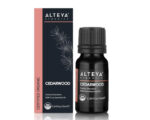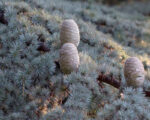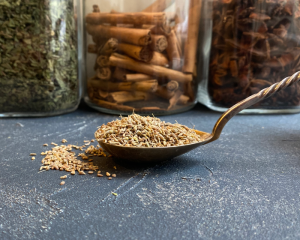

Organic Cedarwood essential oil, 10 ml, ALTEYA
6.00€
Out of stock
Cedarwood essential oil is extracted by steam distillation from parts of the Cedrus Deodara tree. The colour of the oil is light yellow and it has a pleasant, fresh, woody aroma. For centuries, cedarwood essential oil has been used to alleviate mild and severe illnesses in diverse cultures such as American Indians and Tibetan communities. Cedarwood oil is also known as a relaxant for the body and mind and can be used in religious ceremonies and spiritual practices. It is still used for such purposes and in the cosmetics industry.
When used in cosmetics, cedarwood essential oil helps soothe irritated, red and itchy skin, as well as dryness that causes cracking, peeling or blistering. Cedarwood oil also protects the skin from environmental pollutants and toxins, helping to prevent or reduce the risk of rashes. Cedarwood oil is believed to regulate sebum production in the skin, so it is beneficial for combination or oily skin. Cedarwood essential oil has a cleansing effect on the skin, as it is known for its ability to eliminate some harmful bacteria.
For hair loss, a combination of several essential oils – cedarwood, thyme, lavender or rosemary – is recommended. Dilute these oils with the base oil and apply the resulting mixture to the scalp with light massaging movements, leave on for at least half an hour and then rinse. Add a few drops of cedarwood essential oil to a diffuser to relieve asthma, coughing and other breathing problems. Deep inhalation of its aroma is known to help you breathe easier and promote better sleep. Another way to relieve such symptoms is to massage the neck and chest area with cedarwood essential oil diluted in a base oil.
Cedarwood essential oil blends well with other essential oils such as ylang-ylang, sweet orange, bergamot, juniper, juniper, patchouli, peppermint, grapefruit, lemon, lemongrass, sandalwood, vetiver, ginger and lavender.
Attention
For external use only. Always dilute. May cause skin sensitivity. Keep out of the reach of children. If you are pregnant, breastfeeding or under the care of a doctor, consult your doctor. Avoid contact with eyes, mucous membranes and sensitive areas, inner parts of ears.
Cedrus Deodara essential oil*
* organically certified ingredient
-
Store in a cool, dark place in a tightly closed container.













